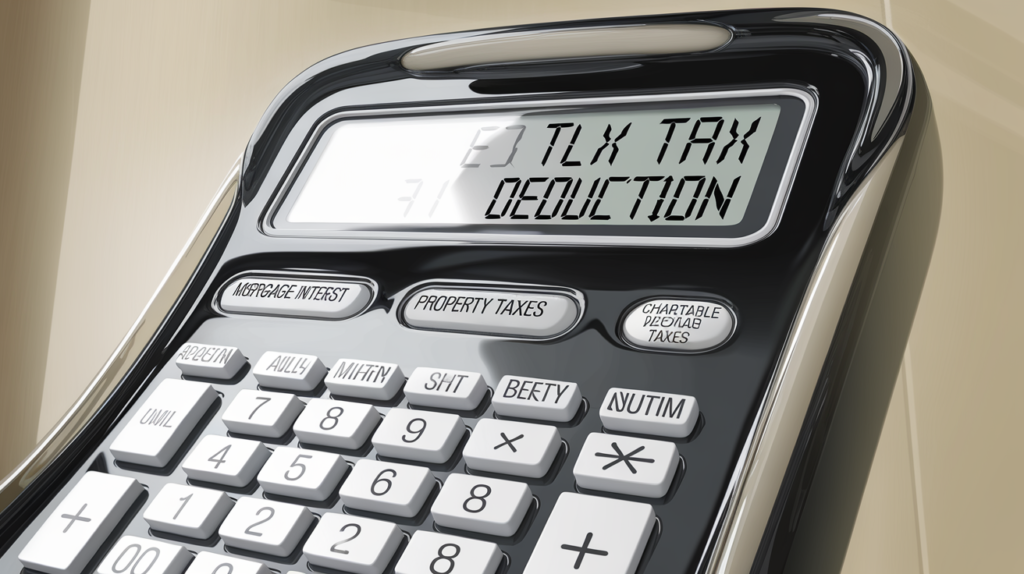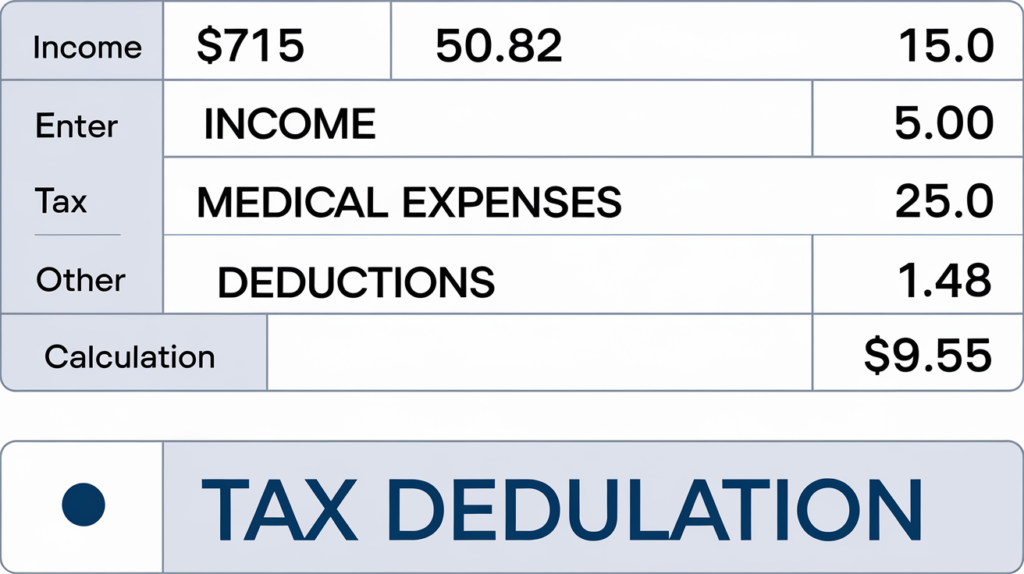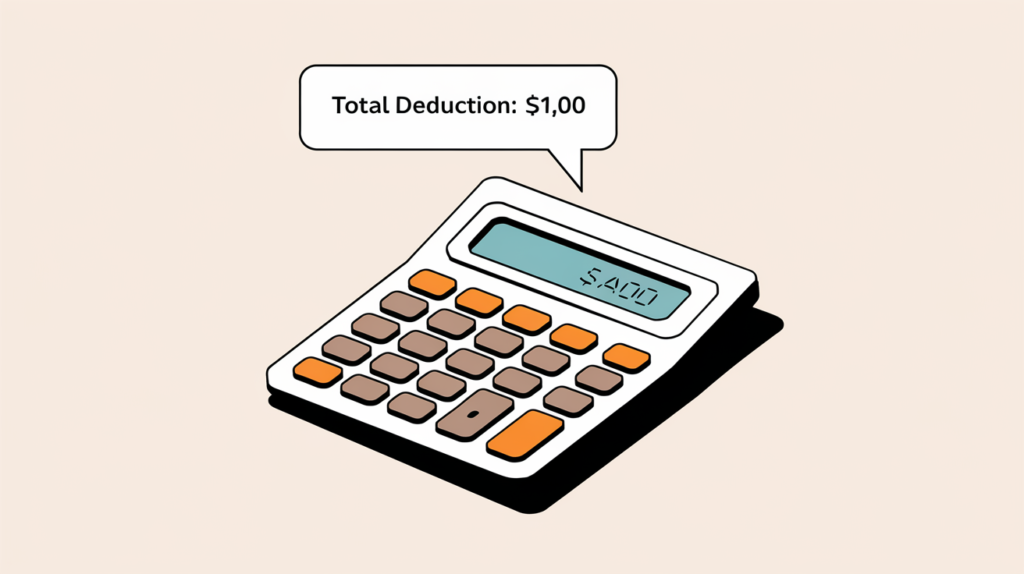Tax Deduction Calculator
Net Income:
Tax Deduction Calculator: Maximize Your Refund
Tax season can be overwhelming, but the right tools can help. A tax deduction calculator is a key tool. It helps you find deductions you might have missed. This guide will show you how to use it to get the most out of your refund.

Key Takeaways
- Understand how tax deduction calculators work and the benefits they offer
- Discover deductions you may have missed that can boost your tax refund
- Learn strategies to maximize your itemized deductions and choose the best option
- Explore tax planning techniques to time your deductions and adjust your withholding
- Streamline your tax preparation process with the help of tax software
Unlock the Power of Tax Deduction Calculators
Tax deduction calculators are great tools for saving on taxes and getting a bigger refund. They make it easy to find deductions you can use. This helps you understand how much you might owe in taxes.
Understand How They Work
These calculators use your personal and financial info to give you a personalized report. Just enter your income, expenses, and life events. They then show you which deductions you might qualify for.
Benefits of Using Tax Deduction Calculators
Using a tax deduction calculator has many benefits:
- They help you plan your taxes better, so you can make smart choices all year.
- They make tax time less stressful by finding deductions early, so you’re not rushing at the end.
- They help you save more on taxes by finding deductions you might have missed, so you get a bigger refund.
Using tax deduction calculators can really help you save money and improve your financial health.
Tax Deductions You Shouldn’t Miss
Maximizing your tax savings is key when planning your taxes. There are many tax deductions you might not know about. These can include medical expenses and charitable donations, which can greatly reduce your tax bill.
Medical expenses are a big deduction many miss. If your medical costs, like doctor visits and prescriptions, are more than 7.5% of your income, you can deduct them. This can save a lot of money, especially if you have a lot of medical bills.
Don’t overlook charitable contributions either. Giving to charity can lower your taxes. You can deduct cash, goods, or even volunteer hours. Keep good records to make sure you get the most from your donations.
| Deduction | Eligibility Criteria | Potential Tax Savings |
|---|---|---|
| Medical Expenses | Expenses that exceed 7.5% of your adjusted gross income | Significant, depending on your medical costs |
| Charitable Contributions | Donations of cash, goods, or volunteer time | Varies based on your tax bracket and the amount of contributions |
Exploring these tax deductions can help you save more on taxes. Even small deductions can add up. So, make sure you don’t miss out on these tax deductions to get more money back.
Maximize Your Itemized Deductions
When planning your taxes, understanding itemized deductions is key. Medical expenses and charitable contributions are two areas that can greatly reduce your taxes. By documenting and claiming these deductions, you can maximize your tax return.
Medical Expenses
Medical expenses can be deducted if they are more than 7.5% of your income. This includes many healthcare costs and travel for medical reasons. Keep all receipts and records to support your claims.
Charitable Contributions
Donating to charities can also lower your taxes. This includes money and goods given to qualified organizations. Make sure to save receipts and letters of acknowledgment for your donations.
Learning about itemized deductions can help you save more on taxes. Keep accurate records and talk to tax experts. This way, you can make the most of your tax planning and get the best tax savings.
Standard Deduction vs. Itemized Deductions
Understanding the difference between the standard deduction and itemized deductions is key to saving on taxes. The standard deduction is a fixed amount that lowers your taxable income. Itemized deductions, on the other hand, let you claim specific eligible expenses.
When to Choose the Standard Deduction
Choosing between the standard deduction and itemized deductions depends on your financial situation. It’s usually better to pick the standard deduction if:
- Your total eligible itemized deductions are less than the standard deduction amount.
- You don’t have many qualifying expenses, like high medical costs or big charitable donations.
- You prefer a simpler tax preparation process.

However, if your itemized deductions are more than the standard deduction, it’s better to itemize your deductions. This can lower your taxable income and increase your tax refund.
Good tax planning is essential to get the most from your deductions and save on taxes. Knowing the details of standard and itemized deductions helps you make smart choices. This way, you can navigate the tax world and get the best financial outcome.
Tax Deduction Calculator
A tax deduction calculator is a great tool for getting the most out of your tax refund. It helps you figure out how much you could save by finding deductions you might not know about. By entering your personal and financial details, you can better understand your tax situation and plan wisely.
Using a tax deduction calculator can reveal deductions you might have missed. It can show you things like medical expenses and charitable donations that can lower your taxes. Knowing all your tax deductions helps you plan better and save more.
Also, a tax deduction calculator gives you an idea of your tax refund. This is very helpful for budgeting and planning your finances for the next year. Knowing your refund helps you prepare your taxes and adjust your paycheck withholdings.
In the end, a tax deduction calculator is a key tool for understanding and using tax deductions. It’s useful for both experienced and new taxpayers. Adding it to your tax planning can greatly improve your financial health.
Tax Planning Strategies for Maximum Savings
Tax planning can seem complex, but the right strategies can lead to big savings. Focus on when you claim deductions and adjust your withholding for a better refund.

Timing Your Deductions
When you claim your deductions matters a lot. Planning can help you save more on taxes. Here are some tips:
- Bunch your deductions: Group eligible expenses, like medical costs or charitable donations, in one year. This can help you meet the standard deduction threshold and get itemized deductions.
- Accelerate or delay deductions: Depending on your situation, you might be able to move deductions to a better tax year. This could mean prepaying expenses or delaying income.
Adjusting Your Withholding
Your withholding affects your refund or how much you owe at tax time. Adjusting it can improve your cash flow and earn interest on overpayments. Here’s how:
- Review your W-4: Check and update your W-4 form to make sure the right amount is withheld from your paychecks.
- Optimize your withholding: Use an income tax calculator or talk to a tax expert to find the best withholding amount for you.
- Adjust as needed: Keep checking and adjusting your withholding throughout the year. This helps avoid surprises when you file your tax return.
By using these tax planning strategies, you can get the most out of your tax deductions and tax savings. This leads to a better outcome when preparing your tax return and getting your refund.
Streamlining Tax Preparation with Software
Preparing your taxes can feel overwhelming. But, tax preparation software has changed the game. These tools make filing your taxes easier and help you find all the tax deductions and tax savings you deserve.
Popular Tax Software Options
There are many tax software options out there. Here are some of the most popular ones:
- TurboTax: This software walks you through the tax preparation process. It helps you get the most out of your tax deductions and tax savings.
- H&R Block: Known for its tax software, it offers both online and desktop versions. This meets the needs of all taxpayers.
- TaxAct: It’s easy to use and affordable. TaxAct helps with tax planning and filing step by step.
- FreeTaxUSA: It’s free for simple tax returns. But, you can upgrade to a paid version for more complex tax scenarios.
| Tax Software | Pricing | Key Features |
|---|---|---|
| TurboTax | $59 – $199 | Comprehensive guidance, import tax documents, maximize deductions |
| H&R Block | $49 – $169 | Secure data storage, tax expert support, audit assistance |
| TaxAct | $0 – $99 | User-friendly interface, tax planning tools, multi-state filing |
| FreeTaxUSA | $0 – $47 | Free federal filing, easy tax return preparation, audit support |
Using tax software makes tax preparation easier. It helps you get the most tax deductions and makes filing your taxes stress-free.
Expert Tips for Stress-Free Tax Filing
As tax season gets closer, many people feel stressed and anxious about filing taxes. But, with the right strategies and expert advice, you can make the process easier. Here are some tips from tax experts to help you feel more confident:

- Organize Your Documents Early – Start collecting all your tax documents, like W-2s and 1099s, early. This way, you won’t have to rush at the last minute.
- Maximize Your Tax Deductions – Use tax software or a tax pro to find all the deductions you can. This can increase your refund a lot.
- Utilize Tax Planning Strategies – Plan your taxes all year to save money. This way, you can avoid surprises and feel less stressed.
- Seek Professional Guidance – Talk to a tax expert, like a CPA, to make sure your taxes are done right. They can help based on your financial situation.
By using these tips, you can reduce the stress of tax filing. You’ll feel more confident and focused on saving money.
Conclusion
Using a tax deduction calculator is a smart way to get the most from your tax refund. It helps you understand and use different tax deductions effectively. This way, you can save a lot of money and keep more of what you earn.
We’ve talked about how tax deduction calculators work, the important deductions to know, and how to plan and prepare for taxes. By using what we’ve shared, you can manage your finances better and reach your tax goals.
Being informed and proactive about your taxes is crucial. Use the tips and tools from this guide to handle taxes well. With tax deduction calculators, you can maximize your refund and protect your financial future.
FAQ
What is a tax deduction calculator?
A tax deduction calculator is a tool that finds tax deductions you might not know about. It looks at your income and expenses to guess how much you might save on taxes. This helps you understand how much you might get back.
What are the benefits of using a tax deduction calculator?
Using a tax deduction calculator can increase your refund by finding deductions you missed. It makes tax planning easier and less stressful. It also gives you a clear view of your tax situation.
What are some common tax deductions I should know about?
Common tax deductions include medical bills, donations, mortgage interest, and state taxes. They can lower your taxable income and increase your refund. Knowing these can save you a lot.
How do I know if I should choose the standard deduction or itemize my deductions?
Choosing between the standard deduction and itemizing depends on your finances. Itemize if your deductions are more than the standard amount. A tax deduction calculator can guide you.
What are some advanced tax planning strategies I can use to maximize my savings?
Advanced strategies include timing deductions and adjusting your withholding. Using tax-advantaged accounts like 401(k)s can also help. These methods can lower your taxes and increase your refund.
What are some popular tax preparation software options, and how can they help me?
Popular tax software includes TurboTax, H&R Block, and TaxAct. They make filing easier, guide you on deductions, and work with calculators. This can help you get the most refund.
How can I reduce stress and streamline the tax filing process?
To reduce stress, organize your documents and use tax software. If needed, get help from a tax expert. Stay updated on tax laws. Planning and using calculators can also ease your worries.